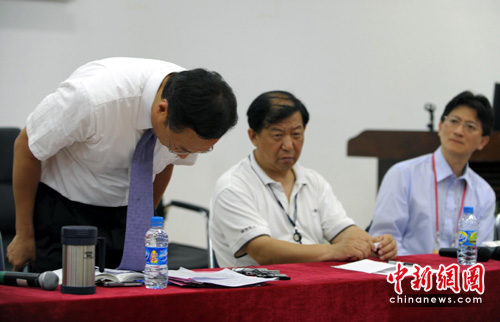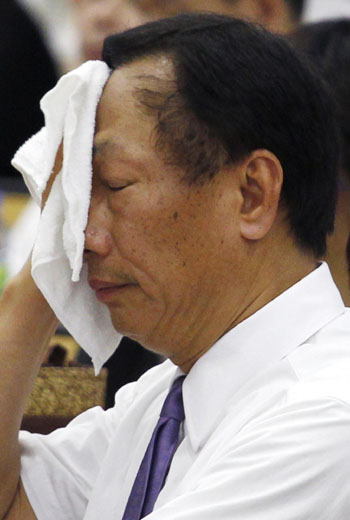The head of Foxconn bowed and apologized on Wednesday for a string of suicide attempts in Foxconn Technology Group, and led a rare damage-control media tour to the factory complex in Shenzhen.

Terry Gou (1st L), founder of Foxconn, bows during a news conference for the Foxconn suicide incidents in the township of Longhua in the southern Guangdong province May 26, 2010.
"I'm very concerned about this. I can't sleep every night," said Terry Gou, Foxconn Technology Group chairman.
"From a scientific point of view, I'm not confident we can stop every case. But, as a responsible employer, we have to take up the responsibility of preventing as many as we can."
The past five months witnessed 12 suicides attempts at Foxconn, most of which the company attributed to personal problems.
Family members of one of the victims - Ma Xiangqian, who jumped from a building to his death in January - protested outside the factory on Wednesday.
 The father said they had come to Shenzhen from Henan immediately after they learned about the news, but the company didn't let them see the body. The company didn't compensate them either, he said.
The father said they had come to Shenzhen from Henan immediately after they learned about the news, but the company didn't let them see the body. The company didn't compensate them either, he said.
Zhang Dongyong, an employee at Foxconn for three years, told China Daily that the suicides are a hot topic among workers.
He complained about harsh working conditions in the factory, and showed an agreement that he and other workers were forced to sign abruptly on Tuesday: It noted that the company would pay no more than the legal minimum for injuries sustained outside the workplace.
Zhang said the company has never talked with them about the suicides and did not disclose the compensation amount, rumored at about 100,000 yuan ($14,600).
Zhang said the company has never talked with them about the suicides and did not disclose the compensation amount, rumored at about 100,000 yuan ($14,600).
Prodded by reporters, Gou said on Wednesday he was taking the injury contract back because its language was not appropriate.
But he noted the company will reduce the amount of compensation, since "high amount of compensation may encourage suicides".
Gou stressed the key to stop the string of tragedies was early intervention.
He pledged to build a safety mechanism that includes training 1,000 psychological counselors to help solve employees' emotional problems.
Labor activists say the string of suicides back up their long-standing allegations that workers toil in terrible conditions at Foxconn. They claim shifts are long, the assembly lines move too fast and managers enforce military-style discipline on the work force.
But Foxconn insists that workers are treated well and are protected by social responsibility programs that ensure their welfare. The Shenzhen factory is perennially a popular place to work, with hordes of applicants lining up for jobs during the hiring season.
During the tour, Gou emphasized the worker amenities that include an Olympic-size swimming pool, banks, bakeries, tree-lined streets and new dormitories catering to many of the 420,000 workers employed in the complex.
He also noted that most of the suspected suicides involved workers who had been at the company for less than six months.
Li Ping, spokesman for the Shenzhen city government, said it was upset about the tragedies, and promised the government and the factory will try hard to prevent a recurrence.
The Taiwan Affairs office of the State Council called on Foxconn to fully investigate the suicides, but said Taiwan investment on the mainland would not be affected.
"We hope the relevant companies care of their employees more," said spokesman Yang Yi.
Apple said on Wednesday it was saddened by the apparent suicides, and would continue to inspect all facilities where its products are made.
"We are saddened and upset by the recent suicides at Foxconn," the maker of iPhones and iPads said in its first public comment on the deaths.
"We are in direct contact with Foxconn senior management and we believe they are taking this matter very seriously," Apple said in a statement.
Separately, Dell said it investigates any reports of poor working conditions in its supply chain.
"We expect our suppliers to employ the same high standards we do in our own facilities," it said in a statement. e complained about harsh working conditions in the factory, and showed an agreement that he and other workers were forced to sign abruptly on